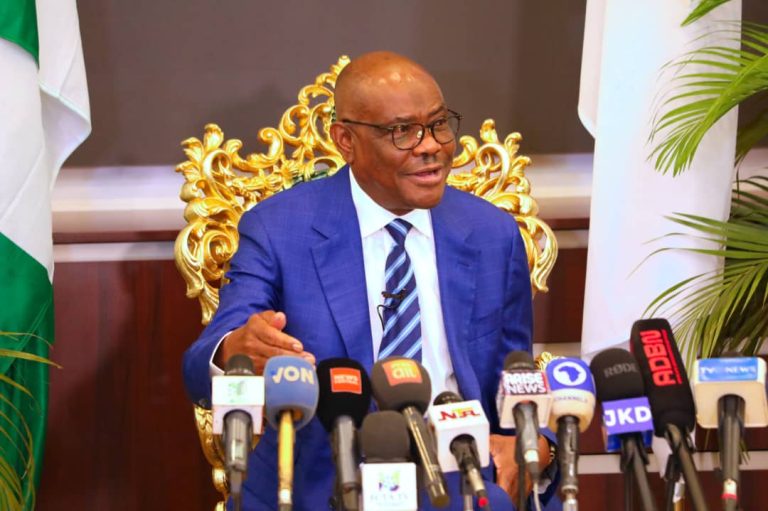The Minister of the Federal Capital Territory (FCT), Barrister Ezenwo Nyesom Wike, has provided detailed explanations for the revocation of land allocations at the Abuja Technology Village, reallocation of University of Abuja land, and other development-related matters. Speaking during his monthly media parley held on Monday, August 4, 2025, the Minister stated that the revocation of the Abuja Technology Village land was necessary to pave the way for the ambitious Abuja City Walk project, inspired by the Dubai City Walk. According to the Minister, the FCTA had provided infrastructure to the area for over 20 years, yet the so-called investors had failed to develop it. Instead, the land was being exploited for private gain, with parts of it rented out for truck parking and other unauthorized activities. Barrister Wike emphasized that the project, originally envisioned as a tech-driven urban development, had become a land-grab scheme. “There is nothing called Abuja Technology Village anymore. They have Certificates of Occupancy (C of Os) but have done nothing with them. The land is better used for something that benefits the city,” he said.
On the newly proposed Abuja City Walk, Wike said the idea was inspired by what he saw in Dubai. The project, now backed by a Memorandum of Understanding (MOU) with a private investor, aims to bring a world-class mixed-use commercial and leisure space to the heart of Abuja. He highlighted that the development would not only enhance the capital’s landscape but also create jobs, boost tourism, and stimulate economic growth. The Minister noted that the investors had submitted preliminary designs and paid all required fees. He assured the public that performance clauses had been inserted into the agreement, and the first phase of the project is expected to be commissioned by 2026.
Addressing concerns surrounding the revocation of land initially allocated to the University of Abuja, Barrister Wike said that the institution still retains over 4,000 hectares of land—an area he described as more than sufficient. He dismissed complaints that the land was mostly rocky, adding that development activities like the EFCC academy are already taking place on portions of the reallocated site. The Minister made it clear that any land left undeveloped after a specified period would revert to the FCTA, stressing the need for accountability and proper land use.
Wike also used the opportunity to address questions surrounding the Bola Ahmed Tinubu International Conference Centre. The facility, recently renovated and reopened by President Tinubu in June 2025, has reportedly generated over ₦1.2 billion in revenue within a single month, compared to just ₦50 million per year under the previous management. According to the Minister, this proves that with proper oversight and transparency, government properties can be highly profitable and self-sustaining.
On education, the Minister pushed back against claims that the FCTA is only interested in “brick and mortar” projects. He explained that the Administration is also focused on rural development, particularly in the education sector. Wike announced plans to commission ten rehabilitated and fully furnished schools located in underserved communities across the Area Councils. He extended an open invitation to members of the press to tour the facilities and independently verify the government’s efforts. The Minister further explained that many of these projects were selected based on consultations with traditional rulers, youth leaders, and stakeholders who helped identify communities most in need.
While acknowledging the financial strain caused by rising wage bills and infrastructure demands, Wike urged FCT lawmakers in the National Assembly to push for a special intervention fund. He argued that the current one percent allocation from the federal government’s share of the federation account is insufficient to meet the capital’s development needs. He also mentioned the FCTA’s growing workforce and the rising cost of maintenance as additional financial burdens.
On the issue of ground rent default, the Minister announced that the grace period has ended and that properties whose owners fail to settle their obligations will soon be sealed off. He criticized wealthy individuals who demand infrastructure but refuse to pay their statutory dues, stating that enforcement will proceed regardless of social status or influence.
Shifting briefly to national politics, Wike reaffirmed his position as a member of the People’s Democratic Party (PDP) while defending his support for President Bola Ahmed Tinubu during the last election. He explained that his decision was based on personal conviction, not political opportunism. Responding to President Tinubu’s characterization of the PDP as a “sinking ship,” and former Governor Ayo Fayose’s remark calling the party a “carcass,” Wike acknowledged the PDP’s internal crisis but rejected the notion that the party was dead. He described himself as a loyal member committed to internal reforms and insisted he would not abandon the party to those he called “buccaneers and vampires.”
The Minister also dismissed the relevance of recent political coalitions, including those formed by members of the ADC, describing them as political jobbers driven by selfish ambition. According to him, many of these figures have a track record of defecting from one party to another in pursuit of power, and cannot be trusted with any national rescue mission.
Speaking on Rivers State politics, Wike said his reconciliation with suspended Governor Siminalayi Fubara represents a step toward restoring normalcy in the state. He also noted that President Tinubu, from what he understands, has no intention of pursuing emergency rule in the state, aligning with the sentiment of the Nigerian public.
When asked whether he would support a PDP presidential candidate from the South or continue backing President Tinubu in future elections, Wike stated that his support for Tinubu was based on the President’s courage and leadership qualities. He particularly praised Tinubu’s controversial decision to remove fuel subsidies, describing it as a necessary but bold move that reflects a willingness to make tough decisions for the good of the country.
Wike concluded the session by promising that the FCT Administration would continue to deliver impactful projects that enhance the quality of life for all residents, while maintaining transparency, order, and responsible governance.



